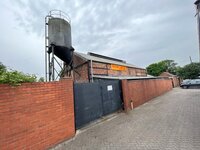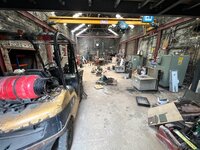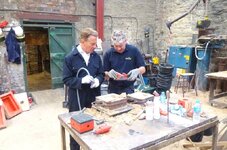Middlesbrough’s historic William Lane Foundry goes up for sale
Dating back to 1862 and operating in Middlesbrough for over a century, the historic Forty Foot Road-based William Lane Foundry has been put up for sale, with the current owners hoping to see the site’s industrial heritage continue.
One of the last survivors of Teesside’s heavy manufacturing era, the Foundry boasts a range of major international, cultural sector and heritage organisation customers across the decades. This has included components for the Teesside steel industry, making parts for the iconic Tees Transporter Bridge, bespoke castings for Beamish Museum, and production of Middlesbrough’s blue plaque scheme.
Specialists in metal working and sandcasting, the work of the Foundry has featured on a number of national TV programmes, including a recent visit by Chris Kamara and filming for Great British Railway Journeys with Michael Portillo with the presenter helping make a casting for the North Yorkshire Moors Railway.
The sale comes at a time of extensive regeneration and new industrial developments along the banks of the River Tees and provides an opportunity for the new owner to be well-positioned to be part of these developments. Recent developments include multimillion-pound investment by nearby AV Dawson at their Port of Middlesbrough facility and the development of the Tees Advanced Manufacturing Park (TeesAMP) on the former site of Newport Ironworks.
Co-owner Stuart Duffy said: “I have worked at William Lane Foundry since I was a teenager and it has been fantastic to work at the Foundry and support the manufacturing heritage of the area through our work with such a wide range of customers. Spanning supplying international engineering firms, making parts for the Transporter Bridge, helping keep the North Yorkshire Moors Railway on track or collaborating with artists at MIMA, it has been a huge source of pride to see William Lane Foundry make an important contribution to so many areas of business and life.”
“Whilst the decision to sell William Lane Foundry has been difficult, we hope that the new owner can take the Foundry and the site forward continuing the work we do in supporting both established and new businesses and industries in the region, across the country and internationally.”
The sale of William Lane Foundry includes the modern day foundry, the original foundry, a separate office block, stores and workshop, as well as surrounding land making for a total site area of 0.25 acres. Estate agent Parker Barras are inviting offers of over £225,000. More information and particulars can be found at https://parkerbarras.co.uk/property/for-sale-industrial-units-forty-foot-rd-middlesbrough-ts2-1hg/.



Dating back to 1862 and operating in Middlesbrough for over a century, the historic Forty Foot Road-based William Lane Foundry has been put up for sale, with the current owners hoping to see the site’s industrial heritage continue.
One of the last survivors of Teesside’s heavy manufacturing era, the Foundry boasts a range of major international, cultural sector and heritage organisation customers across the decades. This has included components for the Teesside steel industry, making parts for the iconic Tees Transporter Bridge, bespoke castings for Beamish Museum, and production of Middlesbrough’s blue plaque scheme.
Specialists in metal working and sandcasting, the work of the Foundry has featured on a number of national TV programmes, including a recent visit by Chris Kamara and filming for Great British Railway Journeys with Michael Portillo with the presenter helping make a casting for the North Yorkshire Moors Railway.
The sale comes at a time of extensive regeneration and new industrial developments along the banks of the River Tees and provides an opportunity for the new owner to be well-positioned to be part of these developments. Recent developments include multimillion-pound investment by nearby AV Dawson at their Port of Middlesbrough facility and the development of the Tees Advanced Manufacturing Park (TeesAMP) on the former site of Newport Ironworks.
Co-owner Stuart Duffy said: “I have worked at William Lane Foundry since I was a teenager and it has been fantastic to work at the Foundry and support the manufacturing heritage of the area through our work with such a wide range of customers. Spanning supplying international engineering firms, making parts for the Transporter Bridge, helping keep the North Yorkshire Moors Railway on track or collaborating with artists at MIMA, it has been a huge source of pride to see William Lane Foundry make an important contribution to so many areas of business and life.”
“Whilst the decision to sell William Lane Foundry has been difficult, we hope that the new owner can take the Foundry and the site forward continuing the work we do in supporting both established and new businesses and industries in the region, across the country and internationally.”
The sale of William Lane Foundry includes the modern day foundry, the original foundry, a separate office block, stores and workshop, as well as surrounding land making for a total site area of 0.25 acres. Estate agent Parker Barras are inviting offers of over £225,000. More information and particulars can be found at https://parkerbarras.co.uk/property/for-sale-industrial-units-forty-foot-rd-middlesbrough-ts2-1hg/.



